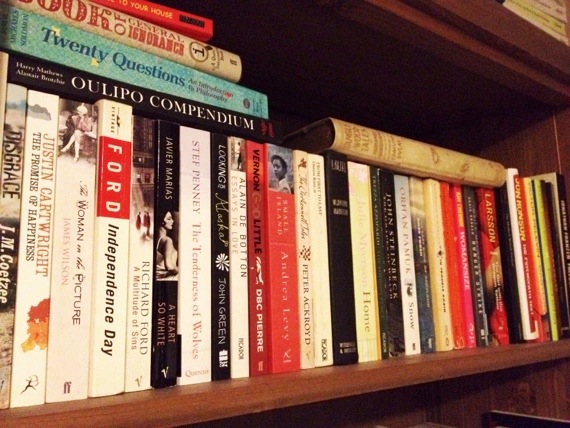When I was growing up the internet didn’t exist. There was no Amazon, no eBook, no literary website publishing short stories and reviews. The only way I knew to find what I might read next was to go to a bookshop (forget the library – I’d read that by the time I was 13). My local bookshop was a Waterstones, well stocked and bizarrely laid out, as it was based in an old building of the university city I lived in. I spent a lot of time stroking the spines, taking down a book, reading a few lines and putting it back. I was poor, you see, and the net book price agreement was still in force.
“The net book what now?” I hear you youngsters cry. Why, this was just a little thing that said a bookshop had to charge the exact price on the back of a book, with none of your fancy modern discounting, thank you. This protected a publisher’s profits, and I imagine the author’s income. But as with all things, the consumer was eventually found to matter more and the agreement was dismantled in the late nineties.
Now I am torn into bits about this, selfish bits and other sadder bits. Firstly, I like books a lot, and I like being able to buy more of them, and yes, I have spent a good deal of money at Amazon. It’s so lovely getting a book through the post. Secondly, without the NBA, supermarkets started selling books, and celebrity memoirs had to be published to subsidise the fiction (I imagine – I can’t see much other need for them). Thirdly, the combination of discounting and the internet enables websites to vastly undercut your local independent bookshop, with the result that so very many of them have closed.
The other day I realised that I was exceedingly lucky. I live within a stone’s throw of several well regarded and *still open* independent bookshops. We obviously read a lot, south of the river. Then I tried to remember the last time I’d been to one, and actually it turned out to be December, but before that…well, who could say?
So I went to one. I was tootling past in the car, saw it, decided to park up and drop in to Dulwich Books. Just like that. No fuss. And while I spent twenty blissful minutes browsing their fiction section, and admiring their well thought out displays, I realised that a good bookshop does a marvellous thing – it narrows your choice. Ordinarily we are against narrowing, especially since we’ve become used to the idea that we can have anything we like as long as it exists on Earth. But how do you choose from the entirety of the published world? How do you discover a new author? How do you wander off piste, avoid the reviews, the mega hitters and find an author that is true to you, on that day, at the very hour?
You browse the well-edited shelves of your bookshop.
Whether you buy a book or not, speak to the bookseller or not, you are still making a connection with another book reading human being just by looking. I can still remember the moment fifteen years ago when I picked up The Wind-up Bird Chronicle by Murakami, and the moment eleven years ago when I picked up Number 9 Dream by David Mitchell. Both books were in the staff picks section, and both authors have played a big part in my reading life. In a smaller bookshop, every book has been chosen to fill the limited space. It’s a bit like choosing from a private library, one selected for the potential clientele that will come through the door, eager to find something new, transporting, transforming.
A plan formed in my mind as I gazed at the spines, feeling once again like the optimistic teenager I was in that Waterstones. In addition to my read more, see more, do more resolution, I am going to set myself a monthly budget of £10 to spend in local bookshops. It’s not much more than the cost of one paperback, but I can roll over the change. My inspiration was the publisher Salt, who ran a campaign to get their website visitors and twitter followers to buy “just one book” from them. If we all bought just one book a month from our local bookshops, instead of succumbing to the click of a mouse every single time, they’d be in much better shape, and with any luck still there when you need them most.
So there’s your challenge, dear readers. Just one book.
This post appears to need footnotes. :
- I would ordinarily have linked to the books in this post, but felt wrong doing it to an online bookshop. I will probably go back to linking to things next post, especially given that I’m not going to close my Amazon account or anything. I just want to even things out a bit. It just feels weird for this one post, is all.
- The book I bought was Lorrie Moore’s A Gate on the Stairs. No, I haven’t started it yet.
